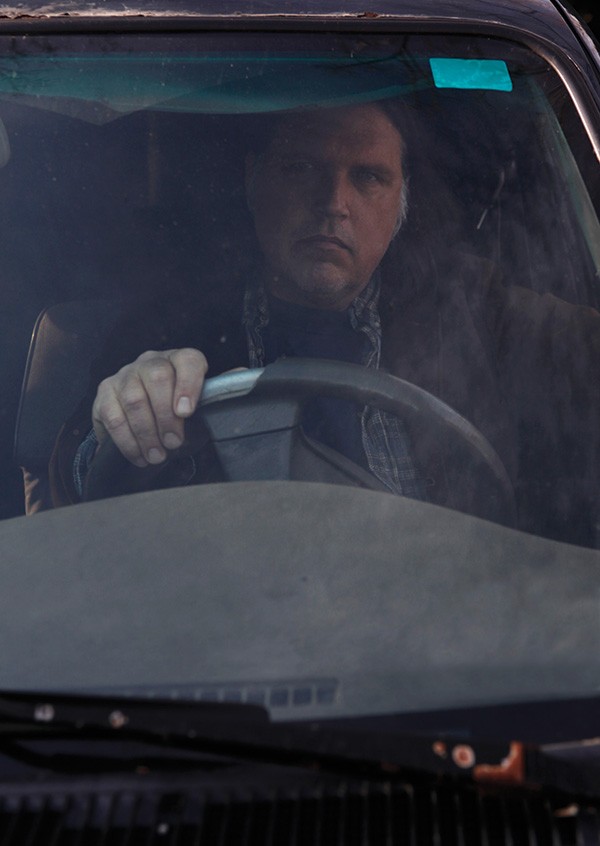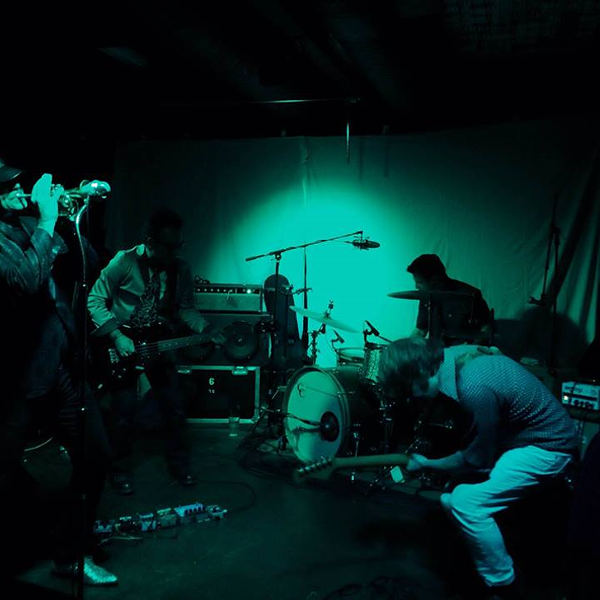With the title, two images came to mind," says Richard Buckner about his 11th and newest album, Surrounded (2013, Merge Records). "One was of a snake eating its own tail. The other is of this character who's looking out through his blinds and seeing that he's surrounded by all these people trying to get in and make him reexamine his past. Both images are about looking back at what I've done and thinking about it, which is a good place to be as a writer—the realization that you can look at what you've done in a different way, even though you can't change what happened."
What happened was this: Richard Buckner was born in 1967 and grew up in California's Central Valley, a traditionally agricultural region that stretches roughly 450 miles from Redding in the north to Bakersfield in the south. "It's still not very developed, mostly orchards like the ones Steinbeck wrote about," Buckner says over coffee in Kingston. "My dad's from Bakersfield, and when I visited him there—my parents were separated a lot—I saw [local country legends and "Bakersfield Sound" pioneers] Buck Owens and Merle Haggard. Later on, I had a storage space right near Buck's nightclub, the Crystal Palace. My family situation was really transitory, we'd move three or four times a year. I have some pretty big gaps in my early education, because of how things were." Was music a big part of his childhood? The brooding singer-songwriter shakes his dark mane. "Nah, not really," he says. "My mom would sometimes play Motown stuff in her sports car and my dad had country eight-tracks in his truck. He also watched 'Hee Haw,' which I hated—I didn't know who any of [the musicians on the show] were back then. It wasn't 'til I got to college that I started learning guitar and writing songs."
College was California State University (the alma mater of one of the literary-leaning Buckner's eventual faves, Raymond Carver) in rural Chico, a bohemian outpost. "It's a good town, it has a really vibrant arts scene," says the singer. "When I was in high school my friends and I would hear about cult movies like Eraserhead and drive up to Chico to see them. I got a job at a record store there, so I found out about R.E.M. and the Replacements and lots of other music I hadn't heard before. Chico's where I got my first taste of playing live, but mostly I was learning to write songs and recording them on a Tascam four-track I'd gotten. I don't know if I'd have become a musician without that four-track."
After CSU, Buckner beat it down to neighboring San Francisco ("Where else are you gonna go?") and started a band called the Doubters to play his songs. "It was pretty loose, just whoever I could get to play with me," he says about the group, whose recordings later appeared on the demos disc Unreleased (1995, Chelsea Records). "We had a pedal steel player sometimes, so some people called us 'alt-country.' That was what was happening in the scene at the time. The country-rock thing really started to come out more when I started working with Lloyd Maines." A Grammy-winning producer and multi-instrumentalist, Maines is the father of Dixie Chick Natalie Maines, a collaborator of Wilco and Uncle Tupelo, and an architect of the moody, sagebrush-swept country-rock sound that emerged in the 1970s from his native Lubbock, Texas—a style best exemplified by the Flatlanders, the legendary group founded by Jimmie Dale Gilmore, Joe Ely, and Butch Hancock. It was at a 1994 show by the latter Flatlander that Maines first encountered Buckner. "My booking agent got me on as an opener for one of Butch's shows at South by Southwest, and I met Lloyd there," explains Buckner. "He said he wanted to make a record with me, so a little later I flew to down to Lubbock and we started recording Bloomed." Buckner's official debut, the intimate, acoustic-dominated Bloomed (1994, Slow River Records; reissued by Rykodisc in 1999), took the No Depression nation by storm, thanks to dramatic tracks like the desolate suicide ballad "22." "The alt-country thing was something writers could hang a hat on," Buckner says. "But I never set out to specifically be a 'country' singer-songwriter; that period just happened organically. I think a lot of it came from the people I was playing with. I always say that if I'd met other players who were more into klezmer music, I would've fit my songs into that setting."














